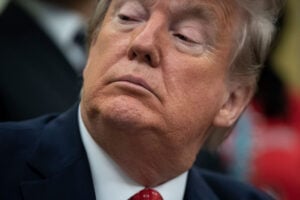More On The Trump 'Disqualified For Insurrection' Debate
It can't all depend on whose ox is gored. The law must mean something.

(Photo by Drew Angerer/Getty Images)
About a month ago, I did you a favor. I read the entirety of Baude and Paulsen’s 126-page magnum opus on why Trump is barred from running for the presidency under Section 3 of the Fourteenth Amendment to the Constitution.
No good deed goes unpunished.
Damned if Professors Josh Blackmun and Seth Barrett Tillman didn’t write their own 126-page magnum opus on why Trump remains eligible to run for the presidency despite Section 3 of the Fourteenth Amendment. So I read that one, too, to allow me to give you a sense of the arguments.
If anyone writes another 126-page article on this subject, count me out. I don’t have time for this.
Baude and Paulsen and Blackmun and Tillman disagree about damned near everything. But I’m going to focus on a single issue: When Trump was president, was he an “officer of the United States”? That’s the threshold requirement for Trump to be barred from running again.
Let’s start at the beginning. Section 3 of the Fourteenth Amendment bars folks from running for president (or other offices), if those folks engaged in insurrection:
having previously taken an oath as a member of Congress, or as an officer of the United States, or as a member of any State legislature, or as an executive or judicial officer of any State, to support the Constitution of the United States
Trump was never a member of Congress, a member of a state legislature, or an executive or judicial officer of a state. The question is whether Trump falls into the second category — when he served as president, did he serve as “an officer of the United States”? If Trump has previously served as “an officer of the United States,” then he’s arguably prohibited from running again for the presidency.
Baude and Paulsen devote just six of their 126 pages to explaining why one who serves as president serves as “an officer of the United States.” Basically, they say: (1) this is the straightforward reading of the text of Section 3, (2) Articles II (the president) and VI (other officers) of the Constitution require certain government officials to take oaths to support the Constitution; the disqualification provision of Section 3 of the Fourteenth Amendment should be read at least to disqualify those required to take oaths; and (3) Section 3’s intent was to be reasonably comprehensive in disqualifying insurrectionists from running for office.
Blackmun and Tillman respond: (1) there is contemporaneous evidence from the days after the Civil War that the people who drafted Section 3 did not believe that one who served as president served as an “officer of the United States”; (2) Section 3’s disqualification clause should apply only to oaths required by Article VI, not Article II, of the Constitution (for reasons that you can read on your own if you’re interested); and (3) multiple other provisions of the Constitution expressly exclude the president and vice president from the category “officers of the United States.”
These arguments are not silly. The Impeachment Clause of the Constitution, for example, says: “The President, Vice President and all civil Officers of the United States, shall be removed from Office on Impeachment for, and Conviction of, Treason, Bribery, or other high Crimes and Misdemeanors.” That sure sounds as though the president and vice president are not included among the “civil officers of the United States.”
I’m not going to judge these arguments; that would require Herculean effort. But I will note that Northwestern Professor Steven Calabresi has changed his mind on this issue, first concluding that Baude and Paulsen had the better of the argument and, more recently, deciding that Blackmun and Tillman rule the day. I know that politicians will scream “politics!” no matter how the courts rule, but the truth is that there are intelligent (and hard) arguments on both sides of this issue.
A coda: Harvard Professor Lawrence Lessig recently wrote a column in Slate arguing that Section 3 should not be read to disqualify Trump. He fears that this would lead us down a slippery slope of trying to decide precisely what constitutes engaging in insurrection under the Constitution.
Again, this is not silly. Suppose Trump’s January 6 plot had succeeded. Pence had disqualified some ballots for Biden, instead counted the Trump ballots, and declared that Trump had been re-elected. Suppose that tens of thousands of Democrats then protested on the grounds of the Capitol. Some of those Democrats, including elected officials, engaged in illegal acts of civil disobedience to show their outrage. Would those Democratic elected officials have engaged in insurrection, disqualifying them from holding future office?
It can’t all depend on whose ox is gored. The law must mean something.
Politicians will squeal to serve their political ends. But intelligent, thoughtful people who care about the law will realize that the disqualification question is a hard and close one. There will be much more to come before the 2024 election.
Mark Herrmann spent 17 years as a partner at a leading international law firm and is now deputy general counsel at a large international company. He is the author of The Curmudgeon’s Guide to Practicing Law and Drug and Device Product Liability Litigation Strategy (affiliate links). You can reach him by email at inhouse@abovethelaw.com.
Sponsored

Law Firms Now Have A Choice In Their Document Comparison Software

AI’s Impact On Law Firms Of Every Size


Why Do AI And Legal Professionals Make The Perfect Partnership?


Gain An Instant Understanding Of New Complaints With LexisNexis Snapshot

Diving Into Generative AI: A Practical Guide For Law Firms Starting From Scratch

Why Do AI And Legal Professionals Make The Perfect Partnership?









